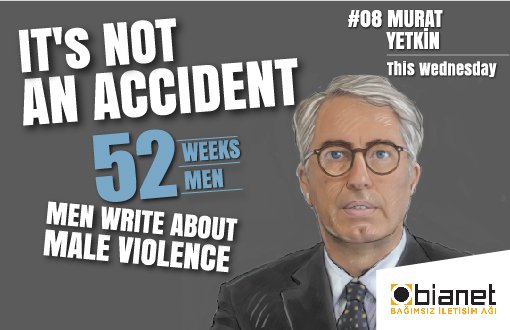Click to read the article in Turkish / Kurdish
You are already familiar with the first state of male violence. The other writers in the "52 Weeks, 52 Men" series have already talked about it, but if you are someone reading this piece then you know it too.
That state is not only sexual violence, but mostly it is that. Back in the day, a retired high judge was talking about the case files he had seen in his career. In all the cases he had tried, the only thing he did not come across was a son raping his father; save for that he had heard "anything and everything you could or couldn't imagine". (He was not sure if this never happened either, for the injured party might have, he was guessing, refrained from bringing this shameful incident to the police station and the court, or just been afraid.)
This state dictates that the use of brute force brings entitlement to everything and that this self-proclaimed right deriving from "animal instincts" can be limited not by conscience or law but only by a superior force.
I do not want to go into examples and put you off further. The Iron Chancellor and unifier of Germany Otto von Bismarck's tenet of "might makes right" denotes this state which is illustrated by various phenomena ranging from the deranged man who attacked a schoolgirl for wearing shorts on a bus because he was "aroused", to the neighborhood inhabitants torturing a kitten to death on the street, from the little bully who pushes and shoves the short child with glasses in the class, to the murderer who finds his divorced wife in a women's shelter and kills her.
According to bianet's "male violence monitoring report", in 2017, at least 290 women were killed by their husbands or ex-husbands, fathers, brothers, male relatives, or other men close to them. Likewise, 22 children and 34 men, who were with the women during the incident or tried to prevent the murder were also killed. 101 women were raped. 247 women were harassed, 376 girl children were sexually abused, 417 women were injured. Unfortunately, the numbers increase every year, and these are only the ones that make it to court; that is how we find out, but as the retired judge said, there are also ones that go unreported.
As for the courts. There was a case I was particularly interested in: 26 people including government employees and shopkeepers who had raped a 13-year-old girl in Mardin in 2011 had been sentenced to the minimum five years each because the Chief Public Prosecutor had not objected.
For those who automatically think "Those parts of the country are always like that" let me give another example from a western province, Isparta: It is 2012, and 26 year old Nevin Yıldırım kills Nurettin Gider with a hunting rifle, cuts his head off, and throws it in front of the coffeehouse in the village square, for raping her at gunpoint, getting her pregnant, and continuing to rape her with the threat of circulating her photos.
Not to approve what she did of course, but the time off for good conduct which is readily granted to rapists and thieves, who simply put on ties and clean up for their court hearings, is denied to Yıldırım, she gets life imprisonment.
Ayşe Arman aptly coined the phrase "Mustachioed Justice" for this situation. Now we move on to the second state of violence, that is the state of gender inequality. The best example of this is the organization of the State.
We have mentioned the courts already, let us start at the top.
In Turkey, where half the population is made up of women, all 17 members of the Constitutional Court, which has had women members and even a woman president in the past, are men. In addition to the Supreme Court of Appeals' president and vice-presidents, the heads of 18 out of 20 penal chambers and 18 of 19 civil chambers are men.
The State Council President is a woman, but there is not a single woman in lower management positions. There are around 16 thousand judges and prosecutors. 66 percent of all judges and 91 percent of all prosecutors are men. The bridge between the judiciary and the legislature is the Supreme Electoral Council (YSK); among its 11 members made up of high judges, there is only one woman. In the Council, there are no women among the representatives of the four political parties represented in Parliament either.
Of the 550 members of parliament (MPs) who entered the Parliament with the November 1, 2015 elections, 82 were women, which is one of the highest numbers of women in parliament to date. There are no women MPs in 43 out of 81 provinces. With a representation rate of 15 percent, our parliament ranks 91st in the world.
Only one of the 18 commissions in Parliament is headed by a woman, and that is the "Committee on Equality of Opportunity for Women and Men", which gives the impression of being established just for show.
Of the 25 Ministers in Cabinet, two are women. There are no women among the 25 Deputy Ministers. Of the 81 governors three are women, and this is the highest number to date. Of the 973 district governors 16 are women.
The best example of women being in decision-making positions within the state structure is in the Ministry of Foreign Affairs; 43 out of 239 ambassadors, and four out of 20 general managers are women, but even here, the rate of women in management positions is 18 percent. In past years there have been women among deputy undersecretaries, but currently there are none.
We say that education is a must, right? There is an even more interesting situation at the Ministry of National Education. The number of female teachers in primary education (151 thousand) surpasses that of male teachers (115 thousand). But the minister, undersecretary, and seven deputy undersecretaries are all men; only one general manager and two of the 81 provincial directors of education are women in the ranks of the Ministry of Education.
89 percent of administrators in decision-making mechanisms of the state are men, and 11 percent are women.
The picture is brighter in the private sector, but only slightly: with women administrators at 13 percent, we rank 41st among 43 OECD member states. Turkey is followed by Japan and South Korea.
The problem is not only about equality of opportunity.
Women who have been oppressed and deprived of education can sometimes become staunch supporters of the imposed order, more so than the imposers themselves, and want their daughters to follow in their footsteps. There was a case on social media the other day. A mother stopped her boy from getting water for his older sister from the kitchen, saying, "Otherwise he'll serve his wife some day", so her daughter got up to get the water herself. This is the lightest of examples; it goes all the way to overlooking and approving a father's rape and torture of his daughters, his sons.
One of my colleagues told me this other story. She is about to go into her house in Yeşilköy, Istanbul when a young couple by the seaside catches her eye. As a woman, she takes offense at the young man's yelling at and shoving the girl. She intervenes from a distance, saying: "What are you doing?" And yes, you guessed correctly, the girl snaps at our friend, saying, "What do you care? Mind your own business". For young girls and boys who have been inured to the mistreatment suffered by their mothers, aunts, sisters, and brothers, that becomes the "norm"; they adopt and perpetuate it.
Gender inequality is internalized. It is the most serious social problem, and not at all easy to deal with.
It has other aspects too.
Women get more tired, working women get more tired, and working women who are married with children get the most tired. Men, even urban-dwelling, educated, self-proclaimed egalitarian men do not lift nearly enough of the burden laid on women. But there is a widespread impression that boys whose mothers work are generally more inclined to share in the household chores and childcare, and girls with working mothers are more confident and less likely to be submissive.
Moreover, we need to not only reform our behavior but also our language. All this time we have been saying "businessman", but now use "businessperson" when referring to women. Why is it so hard to say "businesswoman"? Why was it easy to say, "man of science" but is difficult to say, "woman of science"?
And thus we arrive at the third state of male violence: the state of saying nothing.
The most important task here falls on the progressive, egalitarian men of conscience.
Progressive, egalitarian men of conscience need to stand with women for gender equality.
Just like Nazım Hikmet's lines, "From the mothers' lullabies, to the newscaster's words"... Just like that, in each and every aspect of life... (MY/ŞA/APA/PU/IG)
* Images: Kemal Gökhan Gürses
CLICK TO READ ALL "52 MEN 52 WEEKS" ARTICLES
|





